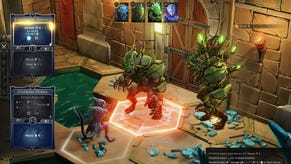Cage sees "polarized" industry that must "grow up"
DICE 2013 Video: Quantic Dream's David Cage outlines 9 things the industry must do and he blasts game critics
In a provocative talk at the DICE Summit today, Quantic Dream's David Cage held nothing back in telling his peers that it's time for the games business to "grow up." Cage described what he sees as a "Peter Pan Syndrome," meaning that the industry has been anxious about growing up and essentially refuses to do so.
He noted that the industry has remained practically the same for the last 40 years - the best selling games continue to be either those from Nintendo, the Call of Duty games or GTA. There are only three genres: kids games, casual and violent games. Games have used the same themes and same worlds and same paradigms, he said. One look at Wolfenstein in 1992 compared to Call of Duty in 2012 shows that graphics have leapt forward, but in the last 20 years the concepts haven't changed much at all - it's still about guns and "kill people before they kill you."
"Buy crap and you will get more crap. Buy risky, ambitious games and you will get more of them"
David Cage, Quantic Dream
Cage said that it's an exciting time for the industry now, and it's time to reassess who we are, how we can do things differently, and how to do them better. He noted that games still live in what he termed "wonderland," a world not connected to our reality, which talks about things that are not related to what we know. And since the games being made are largely the same, the industry has mostly the same audience for 40 years.
Cage commented that games are under immense pressure now; the landscape changes very quickly around us, he said. You see new platforms appearing almost every week, and digital distribution is just the beginning. There's tougher competition for entertainment time nowadays, so the industry must figure out what it can do to make sure people keep playing games.
For older gamers, that's a big problem, Cage noted. It's an issue that the industry keeps making the same games and lacks innovation. Cage wants to see the market move from teenagers to a market where anyone can play. Think about some of your friends or parents or grandparents who have no interest in games, but you can all talk about your favorite book or movie, he said.
Cage then proceeded to outline his nine things the industry needs to change to grow up:
1. Make games for all audiences. How can we make your mother or grandmother play games? It's time to invent interactive entertainment for adults, he said.
2. We must change our paradigms. Violence and platforms are not the only way. We're in an industry where game designers don't know what to do if the character isn't holding a gun, he lamented. You can define interactivity in many different ways. Can we make games that are not based on systems? When you get older, you don't necessarily want to compete in a game with others. You don't want your ass kicked by a 10-year-old. So can we as an industry make games with no gun?
3. The importance of meaning. Many games have absolutely nothing to say. They are empty, he said. So can we create games that have something to say, that carry an idea, that tell you something that resonates with you? Let authors come in! Most games are written by designers or graphic artists or others, he noted. All real world themes should be used - any theme you know in real life could be used in a game. Can we create games that talk about relationships, feelings, politics, homosexuality? Games should be a mirror for what you are, Cage remarked. The game will leave an imprint on you. You will keep thinking. This is what any creative medium should achieve, he asserted.
4. Become Accessible. Focus on minds, not thumbs! He said games should just be about going on a journey, not just about challenging you - like the aptly named Journey, he said.
5. Bring other talents on board (he cited those he's worked with like David Bowie, Ellen Page).
6. Need to establish new relationships with Hollywood. For a long time they saw games like licensed products, but games can be more than that and should be a respected medium, he said. It's time for constructive, balanced partnerships. Cage said game makers and Hollywood can invent a new form of entertainment together.
7. Changing our relationship with censorship. This is a big issue for Cage, which he said he could probably spend 4 hours talking about alone. He noted that while he sees himself as a writer, and he sometimes uses violence or sex, he doesn't like that he has someone looking over his shoulder saying he can't do this or that. It's okay in a movie or TV series, so why isn't it okay in a game? The answer has always been it's because games are interactive. But the truth is it's no different and games are protected by First Amendment now, Cage commented. We shouldn't have different constraints than film, and it's crazy that we should feel constrained like film was in '60s," he said. Cage was also shocked by some games he saw at E3. Some games are just more violent and gruesome and are gratuitous; "we behave like stupid teenagers ourselves, and we need to stop this," he said. "If we don't want to be accused each time something terrible happens, we should show that we are serious, responsible and respect our medium and customers."
8. The role of press. Press is very important, Cage said. He stressed that press are generally very clever, they analyze the business, they evangelize it and try to educate. But he also blasted another segment of the press: the game critics. He claimed that they "aren't press". Being a critic is a serious job but not everybody has the skill for it, he said. He complained that there's no analysis from critics.
9. The importance of gamers. Buying or not buying a game is almost like a political vote, Cage explained. "Buy crap and you will get more crap. Buy risky, ambitious games and you will get more of them. So buying games is also a responsibility," he said.
In the end, Cage just wants to see games transform from "games" to "digital entertainment." This new form of entertainment should be accessible to all, open to all themes and genres, talk to society in meaningful ways, should be based on the journey, not the challenge, should be cross platform, and it should become mass market, he concluded.









